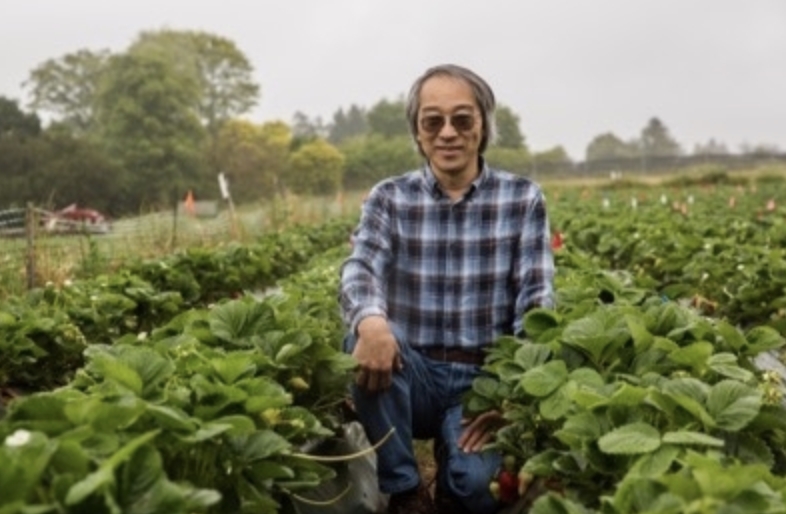
News
The University of California hires first organic specialist
May 14, 2019 By University of California
 Joji Muramoto, a longtime research associate with the University of California Santa Cruz, will coordinate a statewide program focused on the organic production of strawberries and vegetables. Carolyn Lagattuta, UC
Joji Muramoto, a longtime research associate with the University of California Santa Cruz, will coordinate a statewide program focused on the organic production of strawberries and vegetables. Carolyn Lagattuta, UCFor the first time, the University of California has hired a Cooperative Extension specialist dedicated to organic agriculture.
Joji Muramoto, a longtime research associate with the University of California Santa Cruz, will co-ordinate a statewide program focused on the organic production of strawberries and vegetables. His first day in the new position will be May 29.
Muramoto is highly regarded for the depth of his knowledge of soil science and for his pioneering contributions to the organic production of strawberries—a high-value crop that is notoriously vulnerable to pests and soil-borne disease. He will have a joint affiliation with UC’s Cooperative Extension (CE) and the Environmental Studies Department and the Center for Agroecology and Sustainable Food Systems (CASFS) at UCSC.
CE specialists serve as liaisons between the university and the agricultural sector, building research programs that align with the needs of farmers and conducting collaborative on-farm studies that address problems growers are facing.
“I’m honored and humbled to have this position,” said Muramoto, who plans to focus on soil fertility and the organic management of soil-borne diseases. In his position as assistant specialist, he looks forward to expanding his reach statewide and to coordinating short courses on organic pest management and organic soil fertility management.
CASFS Director Daniel Press said the establishment of an organic specialist is long overdue — and that Muramoto was an excellent choice.
“This is highly visible, public recognition of the significance of agroecology and organic agriculture,” said Press. “It signals to the community of organic growers that we are a partner with them. They know this is for them, and they really love it.”
UC Santa Cruz has played a vital role in the flourishing of organic farming on the Central Coast and beyond, through undergraduate education, training provided by the Apprenticeship in Ecological Horticulture, CASFS, and faculty research projects, many of which Muramoto supported in his capacity as a research associate. Thirty percent of agriculture in Santa Cruz County is certified organic, said Press, who called the figure “astonishing.”
“Joji is an exceptionally accomplished, skilled, talented, and respected scientist,” said Press. “His list of publications is as long as many of my colleagues.’ Now it’s his show. He’s the organic production specialist in the state.”
It is also a sign of the times that UC Santa Cruz was selected to partner with UC’s Division of Agriculture and Natural Resources (ANR) to create this CE position, said Press. Despite its strength in agroecology, Santa Cruz is not one of UC’s traditional “ag schools.” But times are changing, and the Berkeley, Davis, and Riverside campuses are no longer the only hosts of these valued positions.
“We have a long record of important ag research coming out of UC Santa Cruz, but it hasn’t been part of a permanent program or a formal network,” said Press.
Tragedy inspires a commitment to organic agriculture
Muramoto’s commitment to organic agriculture is almost as old as he is. When he was a boy growing up in Tokyo, Muramoto lost his six-year-old sister to leukemia. His parents were shocked and devastated. Their loss took place when many people in Japan were concerned about pesticide residues in produce, spurred in part by Rachel Carson’s book Silent Spring and the emergence of the organic movement in Japan.
“My mother wanted to do something,” recalled Muramoto. “There was no direct evidence between pesticide residue and cancer, but she didn’t want her daughter’s death to have been in vain, so she joined the early organic movement. She started buying organic produce via the ‘Teikei’ system, which is similar to Community Supported Agriculture.”
During middle school, Muramoto spent school breaks on organic farms in suburban Tokyo. “Organic farmers there told me repeatedly, ‘Soil is the foundation of farming,'” he said. “That’s when I got interested in soil science.”
Today there is much more evidence showing an association between pesticide use and cancer, and Muramoto said, “It is important to increase our efforts to develop agroecological practices to manage pests without using pesticides.” | For the full story, CLICK HERE.
Print this page